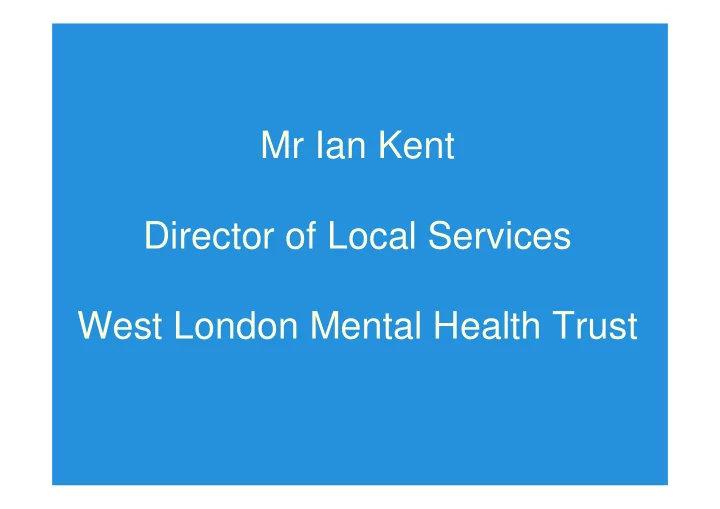

Mr Ian Kent Director of Local Services West London Mental Health Trust
About the Trust • Whole spectrum of mental health services • One of only three including a high secure hospital • Around 30 sites spread across 45 miles • Plan to spend around £238m this year • Around 4000 staff
About the Trust • Up to 20,000 patient contacts every year at home, in clinics and in hospital • Who buys our services? – Three primary care trusts (PCTs) – Commissioners for specialist mental health in NW London sector – High secure commissioning
About the Trust Forensic Services • Based on two sites • Redevelopment of Broadmoor Hospital • Service developments Local Services • Comprehensive range of mental health services to three boroughs and two national services • Partnership / inter-agency working • Service developments
Prevalence and severity � London spends 21% more than England average � PCTs spend approximately 12% of budget on mental health – c. £1.7 billion across London � Very high levels of mental health needs associated with: � poverty and unemployment � social isolation, crime, drug misuse
Prevalence Across a typical population of 100,000 Londoners Psychotic illness 257 (0.25%) Depression and anxiety disorders 10,725 (11.1%) All phobias 2,440 (2.5%) Drug dependence 2,697 (2.7%) Alcohol dependence 5,202 (5.3%) TOTAL 21,322 (22%)
Inequalities and diversity • Life expectancy 10 years less for those with long-term, serious mental illness • High rate of diabetes, obesity and substance misuse • Only 26% of referrals from GPs are from BME groups • BME groups more likely to be referred by the police: 62% • All BME groups have higher rates of detention than white British but black groups have the highest rates • All black groups more likely to experience restraint and seclusion
Proposals: clear pathways Integrated care and partnerships • Public health needs assessment for mental health • Commissioning (joint) development • Shared care protocols • Physical healthcare – diabetes, obesity, substance misuse • Network of care from multi-disciplinary team (MDT) • Access in a crisis
Proposals: promoting recovery and social inclusion Individual needs and choices • Individual care plans – risks and needs assessment: • Understanding/ownership by patient • Choice • Home, community, inpatient • Medication/therapy • Provider – primary care, specialist services, voluntary sector • Promote mental well-being
Proposals: early intervention • Prevention is better than cure • Work with young people aged 16-25 • Improved outcomes • Stay in education, training, home • CAMHS co-location family health and social care • Prompt access to psychological therapies
Proposals: local treatment within the community • Local where possible, central where necessary • Fewer beds (down 15.4% from 1998/9 to 2004/5) and continuing (slower rate) • Significant expansion of capacity and range of community provision • Vision for inpatient services: • Manage crisis, identify and initiate new treatment • Quality of environment and therapeutic milieu • Vision for community services: • Assessment, rehabilitation, recovery, therapy • Co-location with key partners - polyclinic
Next Steps • Established Clinical Care Pathway Group- Chair Professor Thorncroft • Key Recommendations: – Investment in a full and sustainable information campaign using modern communication methods to raise public awareness of mental health needs, and to reduce stigma and discrimination – Give far greater emphasis to the views of service users and carers in identifying needs with advance personal care agreements implemented for all
• Ensure assessment procedures are substantially redesigned to produce consistency and reduce variation. • Develop a system of care where assessments include an evaluation of physical as well as mental health needs • Where the evidence supports more than one type of intervention at any clinical care pathway stage then these should be offered as choices to services users
• The interventions delivered to people needing the treatment and care contained within a particular clinical care pathway should be available regardless of where the person lives. • Models of care co-ordination that use regular reviews of needs should be assessed using minimum standards, continually checking the appropriateness of the choice of care pathway.
• There is a clear need to make exit and re-entry arrangements clearer and easier from the perspective of service users and family members. This approach is sometimes called “Easy in – easy out”. • NHS London may benefit from working across the capital with a range of pilot sites on the introduction of a small number of clinical care pathways in the first case with a focus on identifying good practice that enhances engagement and implementation • Implementing Healthcare for London Workstream for mental health established
Recommend
More recommend